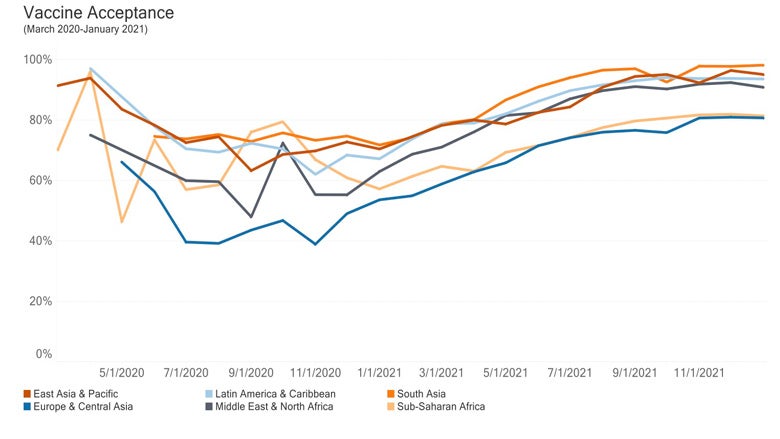 Source: World Bank
Source: World Bank
Elena, a 65-year-old grandmother in rural Romania, had been hard hit by the COVID-19 pandemic. Government-mandated restrictions in people’s movement had left her isolated and unable to visit the hospital for her routine physical exams. Elena had heard over the radio about a new vaccine, available at no cost, that held the promise of an end to this pandemic. Her children who live in the capital, Bucharest, had been vaccinated, but Elena had not. With the closest vaccination point being so far away, and with no family doctor in her community, the means to protect herself through a vaccine seemed out of reach.
Since January 2020, one in ten people in the Europe and Central Asia region has been diagnosed with COVID-19, making the region the hardest hit emerging market and developing economy (EMDE) in per capita terms. With countries testing below recommended levels, it is likely that the burden of disease is much higher. While the region is emerging from the Omicron wave, mortality rates are rising in several countries and the threat of new variants remains a concern. The health system response to the virus was initially focused on social distancing, surveillance, and public health measures – and has been bolstered by the discovery of effective vaccines.
Enhanced immunity is the world’s best defense against Coronavirus and its variants. Hence, national and regional COVID-19 vaccination programs are central to the strategic efforts to accelerate an end to the pandemic. And yet, as of the first quarter of 2022, only 47 percent of the Europe and Central Asia region is fully vaccinated, leaving the region vulnerable to the virus. At the current pace, over half of the countries in the region may not reach 70 percent of their populations with one dose by June 2022. Given the ongoing conflict in the region, disruptions may cause further setbacks in vaccination progress in some parts.
While gaps in vaccination coverage are a public health crisis, the slow vaccination pace also presents a macroeconomic challenge. It is expected that emerging variants and large unvaccinated populations will have a negative impact on economic outlook in the region. As of January 2022, the World Bank projects that growth in EMDEs will fall from 5.1 percent in 2021 to 3.4 percent in 2022, with countries with lower vaccination rates facing even weaker growth and recovery.
Highly vaccinated countries to experience stronger growth

Considering the urgency of increasing coverage, it is important to understand and address the bottlenecks that national vaccination programs face. For most of 2021, the main obstacles to vaccinating the region were on the supply-side, including restricted access to vaccines and insufficient readiness to deploy them. As these constraints have relaxed, challenges with vaccine acceptance have emerged as the main obstacle to protecting Europe and Central Asia from the virus; Globally, the region ranks the lowest in vaccine acceptance, with just over 60 percent of people expressing willingness to receive an approved COVID-19 vaccine.
ECA has the lowest vaccine acceptance

Increasing vaccine acceptance will be central to accelerating an end to the pandemic, achieving economic recovery, and putting health systems on a path towards resilience. To this end, in February 2022, the World Bank convened a technical discussion and a Ministers conclave to reflect on high-impact, contextually appropriate approaches to boosting vaccine acceptance in Europe and Central Asia. The discussions included Ministers and Deputy Ministers of Health and Finance, senior policymakers from the European Commission, and leaders of national vaccination programs, who reflected on the links between vaccination programs and economic recovery and the lessons from efforts to increase vaccine uptake across the region.
Successfully scaling up vaccination coverage will require a re-framing of the challenge of uptake. The concept of “vaccine hesitancy” could further exclude or ostracize vulnerable segments of the population who may already be facing barriers in accessing health care, including COVID-19 vaccination. Instead, countries could focus on increasing vaccine acceptance and systematically monitoring the factors that prevent COVID-19 vaccine uptake and using these insights to shape interventions to address the barriers. Our development partners, including the European Centre for Disease Control and Prevention and the World Health Organization, have developed tools in this regard, and the 5-C framework provides a systematic way of classifying these barriers.
The 5-C Framework for Vaccine Acceptance

The importance of a data-driven and tailored approach is critical. In Georgia, for example, the introduction of bonuses to pensioners changed the risk-benefit analysis among the elderly and was associated with a four-fold increase in vaccine uptake in this group.
An optimal approach for countries would consider the political and epidemiological conditions and target the right combination of barriers to uptake. Solutions will require actions that go beyond the span of control of the health sector. Therefore, these interventions will often require a multi-sectoral, whole-of-Government approach, with partnerships between Ministries of Health, Education Social Protection, Interior, Finance, Digital Development, and others.
The World Bank Group will continue to support our clients towards recovery from the pandemic, including scaling up vaccination coverage. As of March 2022, nearly $1.8 billion has been provided to support the COVID-19 response in the region, with an additional $1 billion being reallocated from existing projects, including financing to support vaccine procurement and deployment.
Elena finally received a COVID-19 vaccine after a door-to-door campaign brought Maria, a community health worker, to her door to explain the vaccination schedule, educate her on the benefits, and help get her to a nearby mobile vaccination center.
Increasing COVID-19 vaccine acceptance is a critical step on the road to recovery and resilience in Europe and Central Asia. These efforts will require tailored and data-driven approaches to understanding the barriers to vaccination and collaboration across Government to implement targeted solutions. For Elena and millions of others in the region, accelerating efforts to increase vaccine acceptance will be essential to their health and wellbeing.


Join the Conversation